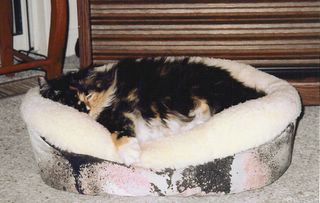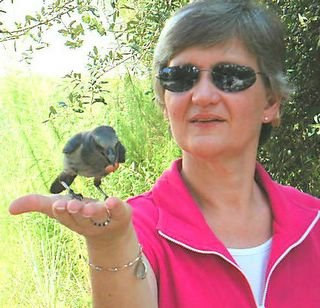A Future and a Hope
“For I know the plans I have for you, declares the Lord, plans for welfare and not for calamity to give you a future and a hope.” Jeremiah 29:11(NASV)
“What’d he say?” my husband asked absently. A young man, who was carrying his young daughter, had just exited the elevator at the Outpatient Center at Johns Hopkins Hospital. The dangling, bare foot of this little one had captured our attention, because it was so peculiar for a cold, December day.
“She just got her cast off,” I replied as we also made our way out of the elevator. We were at the hospital for a “mapping” appointment, scheduled after two months of sound generated by my cochlear implant. It took a few moments before we both realized that a very significant event had just occurred. Could it be that I had heard a passing comment that Gerry had not heard? This was definitely a new experience for both of us, something that had never happened in all our married life!
The Descent
My hearing problems had begun soon after beginning my career as a special education teacher and had progressed (or should I say regressed) in the pattern typical of a person plagued with a sensorineural hearing loss. Bi-annual trips to the audiologist inevitably meant the sad but not surprising news of yet another drop in decibels and the need to invest in a better, more powerful hearing aid. My journey toward deafness was gradual and spanned over two decades, but that did not diminish the devastating effects on my life, professionally and personally. When it was time to speak to my employer about accommodations in the workplace, it felt like the beginning of the end of my professional competency. It was a fairly “tall order” for me to continue to teach phonics to elementary age children with any degree of effectiveness.
I knew that the occasional remark from a colleague or parent intimating that my hearing loss would serve to make me a better, more understanding teacher of children with disabilities was well meaning and sincere. Yet it simply was not true. I had always cared deeply for my young charges and had empathized with their struggles to achieve success in school. I had prided myself in my skills as a resource teacher, honed by nearly 25 years of experience with teaching students of all ages. I knew that what I was dealing with was a decline in teaching skills, not an enhancement, because of my hearing impairment.
My students, for the most part, had been eager to help and to serve as my “ears” whenever they could. My employer was also gracious and willing to act on my suggestions for equipment that might help, such as an amplified phone, a newer model window air conditioner designed for quiet running, a fire alarm with a strobe light, and an FM system to use in class and during faculty meetings. While these assistive listening devices were immensely helpful, I was still having a difficult time coping with the hearing demands of the job.
I guess there is a “line in the sand” when any additional loss in hearing capacity, however small, puts you over the edge in terms of speech comprehension. For me, it occurred sometime in 1999. My acquired lip-reading skills, my ability to fill in the missing words through context clues, and my seasoned aptitude in “faking” it had kept me functional for many years. Now these compensatory strategies were no longer enough. It seemed that the addition of any background noise or any other voices beyond the one person speaking directly to me caused a significant breakdown in communication. I just couldn’t grasp what people were saying!
I think the private realization of my approaching deafness came when I began to understand that being deaf was not really defined as the total absence of sound but rather the inability to understand speech if your eyes are closed. You see, I could no longer understand anything people said when I could not see their faces. Using the telephone, even with a patch cord to transmit the sound to the FM boot on my hearing aid, was not satisfactory. There were the colossal headaches and the ever-present fatigue that comes from the stress of always being on the alert for conversation that might be taking place around me. Many of the sounds amplified by my aid were not only distorted but also painful because of my recruitment problems. I began to dread the thought of another day of social encounters. I had long since removed myself from the daily lunchtime crowd in the teachers’ lounge, choosing to close my classroom door and relish the silence. I prayed that somehow I could make it through the afternoon with some semblance of efficiency.
There were many humiliating incidences that I still recall with raw emotions during those dark days when my hearing aid was no longer adequate for the demands of my job. I had arrived early one morning and had hastily clamored into school with an armload of files and with a mind preoccupied with the myriad of things on my “to do” list. It was now several hours later when I happened by the side door as a colleague was entering the building. She asked, with finger pointing toward the parking lot, “Isn’t that your car over there with the motor running?” I mumbled a feeble, “Yes, thank you” and dashed red-faced to the car. There had already been private embarrassments at home when I would return to the bathroom for a last minute mirror check and discover, to my surprise, that I’d left the water running in the sink, but this event seemed to me to be a very public declaration of the magnitude of my hearing loss.
The social and psychological impact of a profound hearing loss on a person who grew up with normal hearing deserves greater attention than it’s usually afforded. An enormous amount of emotional energy is expended in a desperate attempt to stay connected with friends and family, to continue to share in the spontaneous flow of ideas that maintains relationships. But you sense that you are losing the battle for equal access to communication with each passing day. No more listening to a cassette of relaxing music or keeping abreast of current events by listening to the daily news on the radio during the commute to work. No more picking up the phone to chat with a friend about trivia or about more substantial things that are vital in sustaining friendships. No more enjoyable social outings to restaurants, concerts, movies, or the mall. The burgeoning fears, anxieties, and apprehensions that are attached to new situations, chance encounters, or other social obligations can begin to transform you from a relaxed, confident, and spontaneous person to a withdrawn, tense, and intense observer of life. In short, the stress of my profound hearing impairment was exacting its emotional and physical toll.

